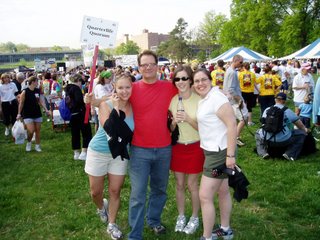[I delivered these remarks on the service celebrating the church's 40th Anniversary.]
Having heard B.N. reflect on our first forty years and B.H. call the roll of our founding members, I want to take the opportunity to lift up our most recent history and speak about this past year. I offer a snapshot of our church on its 40th birthday.
Celebrating our Fortieth Anniversary has been a theme throughout this church year, culminating in our celebration today which was organized by V.T. and L.G. Events throughout the year included a 40th Anniversary themed auction and special bookmarks created by our book group. In March we hosted a dinner for all of the past-presidents of this congregation and many traveled from out of town to be with us. That weekend we dedicated a plaque in their honor, which you can see proudly displayed in the newly redecorated foyer, a project led by J.S. J.G. and B.H. authored monthly articles about SMUUCh’s history which ran in our DrumBeat newsletter. Our 40th Anniversary committee led B&S.H. have helped us celebrate this milestone throughout the year.
Additionally, much unheralded has been S.H.’s heroic effort to tame and organize our church archives and you can see some pictures from our history on the bulletin board in the foyer.
This year is marked not only by looking at our past but by newness as well. Seventy-one new adult members signed our membership book this year. They are joined by eleven members of the Coming of Age class who joined as youth members after a year long program of service and faith development. Our current membership now stands at a touch over 300 members. Next November I will participate with eleven other Unitarian Universalist ministers in a summit on growth. We were selected on account of serving some of the fastest growing churches in the movement and the twelve of us will be brought together to share best practices for growing churches.
There were other forms of newness in abundance as well. We had a baby boom, and even though we finished well short of our goal of forty new babies, we did celebrate a dozen births! At the other end of life’s spectrum, this year we marked the death of Marian Davis. Many of you were there for her memorial service in October. We also lost Delta Gier, husband of Audre Gier.
In this past year we grew not only numerically, but in programming. Dave debuted the one-hour choir and we formed a new brass quintet, a math & science group, a new book club, and a parent’s group, just to name just a few.
And we have also grown in our willingness to be bold and clear and visible about our values. In October we voted overwhelmingly to be recognized as a Welcoming Congregation, declaring our commitment to welcome Gay, Lesbian, Bisexual, and Transgender persons to full participation in all aspects of the life of this faith community. I could not be more proud. In April, we hosted a Stem Cell Forum for the community. This Thursday, we will host a documentary film on the No Child Left Behind act made by high school students. Increasingly, we are becoming what John Buehrens calls “a religious center with a civic circumference” – a place identified for its engagement with key issues of the day.
This past year we continued to make progress towards the fulfillment of our facilities vision. In January, the Facilities Task Force presented its recommendations in a series of small and large group meetings. The Task Force continues their efforts to identify a facility that supports our vision. I understand that this process may be happening both more slowly and more quietly than some of you wish. I really encourage you to be in dialogue with your board of trustees and the task force about your interest in these matters. Or better yet, step forward to serve!
This past year at SMUUCh we did enjoy financial health. Our audit demonstrated fiscal integrity which is more than can be said for one church of note in our city. Additionally, a campaign by our Endowment to celebrate our Fortieth Anniversary raised eighty thousand dollars from twenty four donors. Our Annual Canvass, while it did fall short of the aggressive goal we set, did set a new record. So, even though there are budget items we were not successful in funding, we can celebrate that all of our program staff will be paid at the fair and just compensation levels set by the UUA. This is a justice issue and we can finally be proud to achieve justice for all our program staff.
It wasn’t always an easy year to be honest. For one thing, our two-service schedule is less than optimal and there seems to be no schedule that will fit the programming everybody wants into the times that people want. I admit to being befuddled here. But musicians need a space to warm up. Children need classes. There needs to be enough seats for all who attend. There needs to be a time for fellowship and coffee. We find that adult RE is best attended on Sunday morning and that this tends to be one of the ways that newer people make connections. We’ll have to do the best we can and realize that not everybody will like it.
Another stress is that we would like to see greater levels of participation, commitment, and volunteerism from more of our members. Our new President Jim Crist has identified this as one the priorities of his presidency. I am fond of saying that you don’t have to be already perfect to join a church. Church is a place where imperfect people come to make themselves and each other and the world a little better. Church is the home of the human, and we can expect that humanity will abound, for better and for worse. So, rather than expect perfection, we can work to do a little better each day.
The other thing I can say about SMUUCh in 2007 is this, and it is the truth: I’m proud of what we are increasingly doing in the community. Our coming of age youth each logged at least 24 hours of community service. Our children had three Service is Our Prayer Sundays taking on social action projects. This morning they are doing their fourth, making snack-packs for homeless families served by the Johnson County Interfaith Hospitality Network. This is an organization that helps homeless families in our community with a variety of services. When we help host, we commit to sending teams to two to stay overnight at the churches where the guest stay. The pair does a split shift with each person sleeping half the night. I hope you will join in this outreach. [We donated the plate on this Sunday to JCIHN.]
In recent all-church emails I asked the entire congregation to share their hopes for SMUUCh’s next forty years. I was impressed, touched, and bemused by the different responses I received. Here are just a few:
Of all the responses I received, a few themes seemed to crop up again and again. One of these themes was community. P.G. wrote that her hope for SMUUCh was that we “maintain our sense of community.” M.R. wrote of her hope that the caring concern for one other continues and thrives over the next forty years. B.G. wrote of remaining “a caring welcoming community where people searching for truth can gather and share their search and sense of spirituality.”
Besides community, another common theme was being a lot more visible in the community. D.T. spoke of us acting as a beacon of reason and compassion that reaches the larger part of the Kansas City area population. (I might add that when we did our advertising campaign in 2003, something like one-half of one percent of people in Kansas City had heard of Unitarian Universalism. So, to realize this hope, we would have to do something so bold that over fifty percent of the population knows what Unitarian Universalism is.) B.P. wrote that he hoped we would become “the largest, loudest, and most dynamic liberal voice for religious and social values in the Midwest.” J.C. wrote that he hoped Bill Moyers would be do a documentary about “The Kansas Church that changed the world.” The word beacon was mentioned at least a dozen times.
Two themes were “community” and “beacon.” Social Action was a third theme. B. D. wrote that he hoped social justice would become our mission. M.J. wrote of us becoming a beacon (there is that word again) for liberal religion and social justice. While most people expressed this hope in general terms, one person said that we should hire a social justice and community organizer. This staff person would coordinate our congregation’s social justice ministries, lobby in Topeka for UU values and spur us to live out our values.
We did receive some very specific hopes. G.K. wants us to start a mother’s day out program and offer RE classes at both services. (And, she wants this not for her own children. Her own children are now to old for such a program.) P.L., to name just one or two of her suggestions, says that her hopes start now and they begin with us turning off the TV and the computer and showing up for programming on Saturdays and weeknights, not just Sunday mornings.
P.P/ offered the most creative idea. She dreamed of a new, large church building that resembles the Sydney Opera House. She also says that we will move from our current land, but convert our current property into a pioneer dairy-farm themed Bed & Breakfast and restaurant. And, since our parking area to the West of Saeger House is still zoned as farm-land, we could have actual cows!
However, P., your email was NOT the one that made me exclaim “Wow!” the loudest. That would go to one of our high school students, M.H., who emailed me the lyrics to a country song by Tim McGraw called, “My next thirty years.” “I think I’ll take a moment to celebrate my age / the ending of an era and the turning of a page / Now is the time to focus on where I go from here / Lord have mercy on my next thirty years. / My next thirty years I’m going to have some fun / even as I try to forget the crazy things I’ve done / Now that I’ve conquered all my youthful fears / I’ll do it even better in my next thirty years.”
I have to say, there were several of you, more than just a handful of you in fact, who wrote that you hoped that forty years from now SMUUCh will be having a retirement party for me. I’m not sure how to respond to that. I did think about it and can tell you that that would be 1,500 sermons from now; 2,700 committee-meetings from now; hundreds and hundreds of weddings, memorial services, and child dedications from now; and about a half-million emails from now.
L.C., always the bold visionary wrote her vision as a meditation on our affirmation that love is the doctrine of this church, the search for truth is its sacrament, and service is its prayer. About the latter part she wrote, quote, “Starting now, in forty years I hope that each and every SMUUCHer has internalized this as a personal goal: To know the joy, even the ecstasy, of service. Service each to another, Service to our neighbors, Service to our local community, our nation and our world. Service to our denomination…. Understanding that we are ‘all in this together,’ we cannot help others without helping ourselves.”
Similarly, V.T. wrote, in part, “I hope that our members and friends will become more involved in the life of the church, not only attending Sunday services but involved in the social activities, the social action activities, the day to day work and financial support of the church, because I believe that through this level of involvement we make deeper connections to each other.”
Finally, I wanted to quote from one of our newer members, C.C. who was one of the 71 adults who joined the church in the past year. She writes, “My hope for SMUUCh for the next forty years is that it continues to touch lives as it has mine. To make people feel they have a religious home.”
For so long as there are the religiously homeless, for so long as there are lives to touch, for so long as there are those who are dissatisfied with religious orthodoxy, dissatisfied with a lack of respect for diversity, dissatisfied with the choices our culture and our politics and our thought offer, we will have not only a reason to exist, but we will have a big job to do, a calling, a challenge. We are called to face this challenge and live this calling starting now and for forty years forward and forty more.




